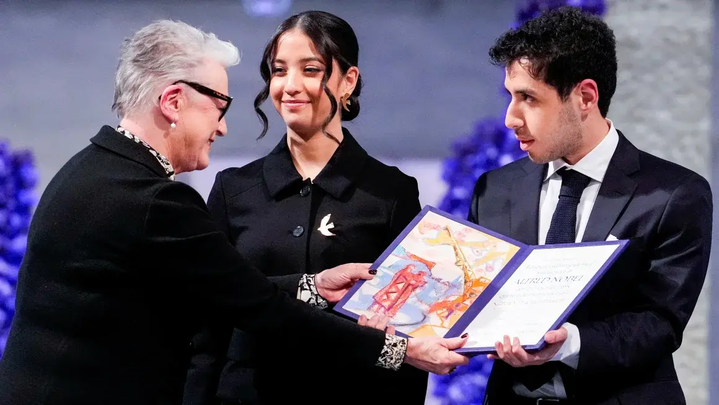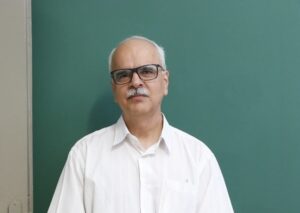On December 10, 2023, Narges Mohammadi’s family was honored at the Nobel Peace Prize ceremony in Oslo, Norway, while Mohammadi herself remained incarcerated in Evin Prison, Tehran. Mohammadi’s children, Kiana and Ali, both 17 years old, accepted the award on her behalf, with Kiana reading the message her mother wrote. The siblings currently live in France with their father, Taghi Rahmani. They have not seen their mother for nine years and haven’t even been able to communicate by phone over the past year and a half.
At the grand Oslo City Hall, Mohammadi’s seat was notably vacant. It is the fifth time in the 122-year history of the Nobel Peace Prize that a recipient has been imprisoned or under house arrest at the time of the award ceremony. German journalist Carl von Ossietzky in 1935, Aung San Suu Kyi in Myanmar in 1991, Chinese dissident Liu Xiaobo in 2010, and Belarusian activist Ales Bialiatski in 2022 preceded Mohammadi in this regard.
Prior to the ceremony, the Nobel Committee had requested Islamic Republic authorities release Mohammadi to accept the award, to no avail. During the ceremony, Iranian photographer Reyhaneh Taravati displayed a portrait of Mohammadi taken while she was on furlough. Berit Reiss-Andersen, the Chair of the Nobel Peace Prize Committee, described the portrait as “capturing the essence of Mohammadi…as it depicted her in a colorful attire, with smiling lips, hair that was visible, and eyes that were directly engaged with the viewer.”
Chair Berit Reiss-Andersen further commended Mohammadi for her contribution to fostering friendship between people and her fight for freedom, gender equality, and unity in Iran. According to Andersen, Mohammadi embodies the criteria of Nobel, serving humanity and advocating for human rights through peaceful means.
The ceremony was attended by prominent figures, including the 86-year-old King, Queen, and Crown Prince of Norway as well as Iranian activists and celebrities such as Shirin Ebadi, human rights lawyer Mehrangiz Kar, and renowned actress Golshifteh Farahani. The event featured performances by Mojgan Shajarian and Mahsa Vahdat as well. Elham Tavakolian, a protester who lost an eye to pellet gunfire during last year’s Iranian protests, was also present.
In her message, Mohammadi expressed her gratitude to the Nobel Committee, describing the award as a significant show of support for the “Woman, Life, Freedom” movement and her desire to receive the award personally. In her speech, she emphasized the ongoing struggle for freedom, equality, and democracy in Iran, recognizing the ongoing resistance of millions of Iranian women against oppression, suppression, discrimination, and tyranny.
She identified herself as a woman of the Middle East who is trapped in the ongoing turmoil of war, terrorism, and fundamentalism. She also acknowledged her fellow Iranian people who have been fighting relentlessly for democracy, freedom, and equality, despite brutal repression from the Iranian government.
According to Mohammadi, the Nobel Peace Prize highlights the significance of the “Woman, Life, Freedom” movement in contemporary Iranian society. In her speech, she called on the international community to continue to support the Iranian people in their fight against tyranny and for democracy.
Taghi Rahmani, the spouse of Ms. Narges Mohammadi, was also able to share his views, and sharply criticized the 2018 U.S. withdrawal from the Joint Comprehensive Plan of Action (JCPOA) and reimposition of sanctions under former President Donald Trump, saying this decision greatly worsened the Iranian people’s situation. He also criticized the civilian toll of the Gaza conflict.
Concurrently, Mohammadi has announced a new hunger strike in protest of Iran’s severe human rights violations against its Baha’i citizens. She joins the ongoing hunger strike of her fellow prisoners Mahvash Sabet and Fariba Kamalabadi, who are themselves imprisoned for their work and status as members of the Baha’i faith.
Iranian authorities dismissed Mohammadi’s selection for the Prize as a political move by the Nobel Committee. Chair Reiss-Andersen countered this by pointing to the political nature of peace and the necessity for social structures to achieve it. She also stressed that the Nobel Prize is not awarded in opposition to any government.
NIAC applauds the awarding of this prize to Narges Mohammadi for her brave activism and as a representative of the Iranian people’s continued struggle for dignity, human rights and a representative government. We sincerely hope that the global recognition that accompanies this prize will bolster the resolve of the Iranian people, especially the Iranian women’s movement, in pursuing their fundamental rights. We also reiterate our call for the Islamic Republic authorities to end Narges Mohammadi’s unjust imprisonment, as well as that of all other human rights defenders who are incarcerated for advocating for their lawful rights.
Back to top
